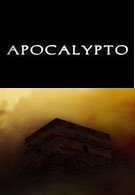 Last Sunday, TIME posted its interview with Mel Gibson, Apocalypto Now. (Clever headline, eh). The article gives us a bit more background about how Apocalypto's themes and story came to be—but it misses a great opportunity to dig deeper into those themes.
Last Sunday, TIME posted its interview with Mel Gibson, Apocalypto Now. (Clever headline, eh). The article gives us a bit more background about how Apocalypto's themes and story came to be—but it misses a great opportunity to dig deeper into those themes.TIME reports that the film was inspired in large part by Gibson’s work with the the Mirador Basin Project (an effort to preserve a large swath of rain forest and its Maya ruins in Guatemala). As Gibson and co-writer Farhad Safinia looked into Maya myths of creation and destruction and research indicating that “ecological abuse and war-mongering” were major contributors to the Maya’s collapse, a story began to take shape—a story its writers believe is very relevant in today’s culture:
Those apocalyptic strains haunt Apocalypto, which takes place in an opulent but decaying Maya kingdom, whose leaders insist that if the gods are not appeased by more temples and human sacrifices, the crops will die. But the writers hope that the larger themes of decline will be a wake-up call. "The parallels between the environmental imbalance and corruption of values that doomed the Maya and what's happening to our own civilization are eerie," says Safinia. Gibson, who insists ideology matters less to him than stories of "penitential hardship" like his Oscar-winning Braveheart, puts it more bluntly: "The fearmongering we depict in this film reminds me a little of President Bush and his guys."Now that's a comment that wasn’t missed by the rest of the media.
It’s here, however, that TIME missed a good opportunity to delve a little deeper. What, in particular, is Gibson referring to in that comment? Bush and his administration’s approach to the Iraq War? Or ecology? Or both? And regarding ecology, how did a vocal religious and social conservative—who’s often labeled a conservative Republican in the media—latch onto that theme?
Gibson is an intriguing figure. People assume he’s a conservative Republican, but he’s never labeled himself as such. He is, however, very vocal about religious and social issues. He’s outspoken about and devoted to his Roman Catholic faith, and he’s voiced strong opposition to abortion, birth control, stem cell research, homosexuality and euthanasia (in particular, Terri Schiavo’s case). Gibson is for capital punishment and the right to bear arms, yet, when it comes to the Iraq War, he’s against it. In a 2004 interview, Gibson, usually a Bush supporter, voiced doubts about Bush and the Iraq War.
Now, maybe the TIME reporter didn’t do his homework, but it seems to me that knowing Gibson’s beliefs and background makes his comment all the more interesting. It makes perfect sense to me how a religious and social conservative can also be an advocate for the environment. And it makes sense to me that Gibson, a religious conservative, would create a film that marries ecological threats with the moral decline of civilization. But for many people out there—both liberals and conservatives, secularists and those of faith—those two themes don’t go together.
TIME missed a chance to explore what many perceive as a paradox. Hopefully, someone else will pick up on it. It is the marriage of those two themes that gives us the opportunity to bring lots of God-talk into the open spaces.
(Image from Cinemablend.)